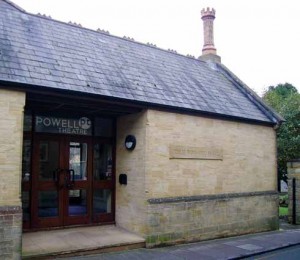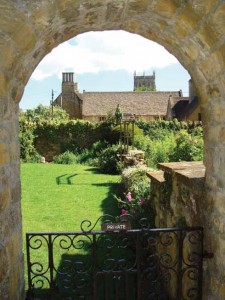Sherborne’s world of film
Sherborne’s music and literary festivals are well known, but it also has a festival for international films. Tony Burton-Page met its director, Roger Johnson.
Published in October ’15
Cathedral cities have a reputation for having that extra touch of class. Dorset, however, unlike all its neighbouring counties, does not have a cathedral: the nearest we get to a cathedral city is Sherborne, with its majestic abbey (a cathedral in all but name) – but it certainly has that touch of class, not least in a cultural sense. As a small rural town, Sherborne does exceptionally well for festivals. Every autumn there is a literary festival, and every May the Abbey runs a music festival, and both of these have become well known beyond the county boundaries.

The poster for In Order of Disappearance, the 2014 Norwegian comedy noir film which SHIFF managed to show before the DVD came out
Less well known is the fact that every October since 2009 the town has been host to a festival of world cinema, the Sherborne International Film Festival – SHIFF. ‘World cinema’ is a phrase which nowadays encompasses any film except a Hollywood blockbuster or a film which might be shown by a commercial cinema chain. So how does it come about that this little town has a festival devoted to films which could be given that damned-with-faint-praise tag, ‘minority interest’?
The answer lies with its founder, Roger Johnson. Roger moved to Sherborne twelve years ago, once his children had left school. ‘We wanted to move further west,’ he says, ‘but I was still working in London, so we needed somewhere with a rail connection – and Sherborne was undoubtedly the nicest town on the railway!’

The Zest Café in Abbey Street is one of the beneficiaries of SHIFF’s fundraising. The Powell Theatre is two doors down the street.
Roger’s background was marketing and in particular tourism, so it was only a matter of time before he got involved with that aspect of Sherborne life. He eventually became chairman of the Sherborne Area Tourism Forum and was asked to write a Tourism Strategy, which the Town Council accepted and endorsed.
He also became a member of the Rotary Club of Sherborne Castles, who were looking for ideas to raise money for charities or to perform some service for the community, ideally at the same time. One of Roger’s initiatives was the ‘Hidden Gardens of Sherborne’ event, and another was the International Film Festival.
‘My wife and I are both keen on world cinema – whenever we were in London we used to catch up on the foreign language films – and we thought that we surely couldn’t be the only people in the area with this interest, particularly in a place as culturally rich as Sherborne. It seemed to us that foreign films were becoming more important and more appreciated. So we decided to try and set up a festival.’
The first task was to find a venue, so Roger approached Sherborne School. ‘The Powell Theatre is the only venue in Sherborne with a raked auditorium, which is essential for a good cinema experience. It’s a large space and can seat 200 people – it used to be an extension of the Cheap Street Church, but Sherborne School took it over some time ago and use it for their productions, concerts and lectures. Realistically, it was the only place in Sherborne where we could do the thing properly – it has up-to-date projection facilities and an enormous screen, which covers the whole of one of the walls of the building, so you could really do justice to a film.

SHIFF Director Roger Johnson and the Rotary Club of Sherborne Castles President, Michael Peart, outside the Powell Theatre at the inaugural event in 2009
‘The school said they were happy to go along with it, provided we programmed the festival for a time when the pupils weren’t there. We opted for the half-term holiday of the Christmas term, so the festival is always at the end of October or beginning of November. We started it as just a two-day event, but we gave it a lot of publicity, as much as we possibly could, and it took off. The next year’s festival was three days long, with three films a day, and audience numbers doubled and ticket sales went up by 60%. The next year we added another film, which we showed as an ‘opening night’ event, with drinks and nibbles, and that’s where the festival stands now, with ten films over four days.
‘What I’ve done since the first festival is to develop a database – with my background in marketing I’m very interested in feedback and market research, so I always handed out questionnaires as the audience came out of every film to ask if they’d enjoyed it, and how we could improve, and how they rated the film. So now on the website you can find out the rankings of each year’s ten films, in terms both of attendance and popularity, as well as comments from the filmgoers about the festival itself.
‘Working out the programme is quite a challenge. For one thing, the Sherborne audience is very discriminating! And then there is the indisputable fact that it’s so easy to see films in your own home nowadays – DVDs come out only three months after their cinema release, and in some cases you can see a film online on the same day it’s released in London if you belong to a club like Curzon Home Cinema. So we have to offer something more, not only a film which is going to interest people, but also a community event: watching a film at home is a totally different experience from watching it on a superb screen like the one in the Powell Theatre, and if there’s a glass of wine and something to eat between films and at the end of the evening, it becomes a more interesting social activity – a community event. Moreover, every film is introduced, with information about the cast and the director and so on.’

❱ The Tourist Information Centre manager, Janet Schofield, shows the programme to an interested visitor
Roger himself does all the introductions, having an encyclopaedic knowledge of films. Even so, selecting the programme for each year involves much hard work. ‘I do a lot of research. I read Sight and Sound, the British Film Institute’s magazine, from cover to cover, as well as the Curzon Cinema newsletter, I read all the newspaper film reviews – and, most importantly, I watch lots of films. To get ten films for the festival, I watch at least a hundred films – I never show anything that I haven’t seen myself. It’s quite important to choose films that have been released fairly recently – if it’s from too far back in the past, say 18 months or so, more people are likely to have seen it. I search up until June, because after that the DVD won’t arrive in time for the festival in October. But something we have started to do is to show a few classics of world cinema, and that has proved very popular. The BFI retrospectives give a good lead for choosing these films.
‘Actually getting hold of the film to show it is becoming more and more of a problem these days. The distributors are understandably cagey about video piracy and are increasingly reluctant to part with a DVD of a recent film because it can so easily fall into the wrong hands. Many companies want to move towards a system of streaming the film digitally to your projector for a specified duration at a specified time. The Powell Theatre doesn’t have this capability at the moment, so we have to use the DVDs. Sometimes the distributors insist that we return them by courier the day after the screening, which certainly doesn’t make life easy for us.’
Roger’s love of film stems from childhood – Saturday mornings watching the Lone Ranger serials and the like introduced him to a magical world – ‘I was hooked at an early age.’ As a student, he specialised in French and Spanish and naturally watched films in those languages – he remembers with affection ‘those French movies of the 1960s where nothing happens for half an hour…’ Subsequently he and his wife lived overseas – Brazil, Italy, Mexico, France – and got used to seeing films in different languages. ‘Subtitles aren’t a problem for us – I know they are for some people, but the screen at the Powell Theatre is so large that they are easy to read.’
Roger’s love for French films has encouraged him to show such classics as Rififi (with its 28-minute silent jewel heist), Plein Soleil (with Alain Delon as ‘The Talented Mr Ripley’), François Truffaut’s The Bride Wore Black (with the splendid Jeanne Moreau) and Lift to the Scaffold (Louis Malle’s first film, also with Jeanne Moreau). But SHIFF shows films from many, many countries – India (Trishna, Michael Winterbottom’s re-location of Tess of the d’Urbervilles to contemporary Rajasthan), Laos (this year’s The Rocket), Norway (In Order of Disappearance, an ultra-violent comedy), Saudi Arabia (Wadjda, not only the first film to be filmed entirely within Saudi Arabia but by the nation’s first female director) – and so on.
Roger is keen to point out that SHIFF’s main purpose is to raise money for charity via Rotary. Half this year’s profits went to the Zest Café, two doors down from the Powell Theatre, which operates from the Sherborne Centre for Wellbeing, a mental health charity.
And what of SHIFF 2015? Roger wouldn’t be drawn. ‘I’ve got three or four in mind, but there’s still plenty of time. You’ll have to wait and see!’ ◗
Next year’s festival begins on 29 October 2015.
For more information visit
❱ http://shiff.org.uk




